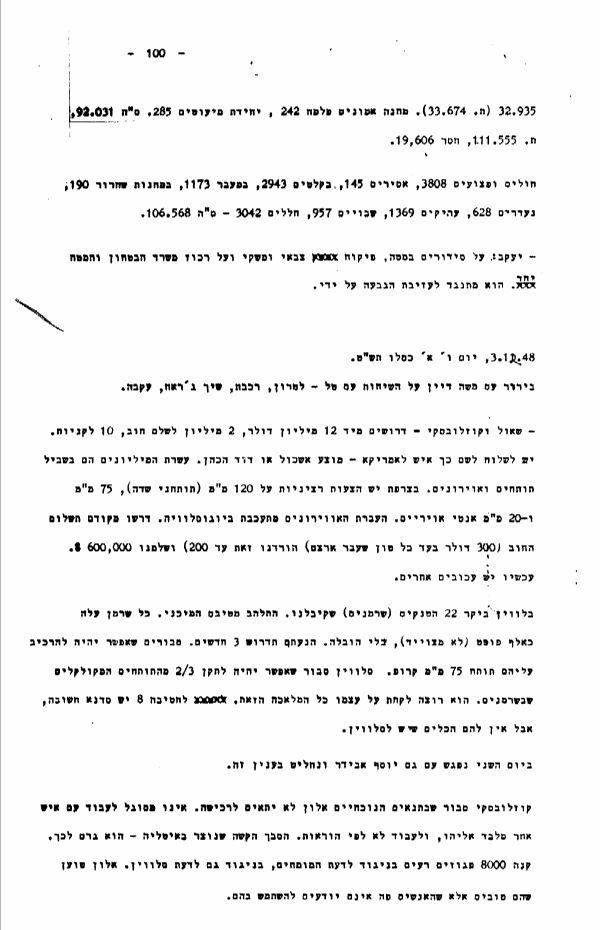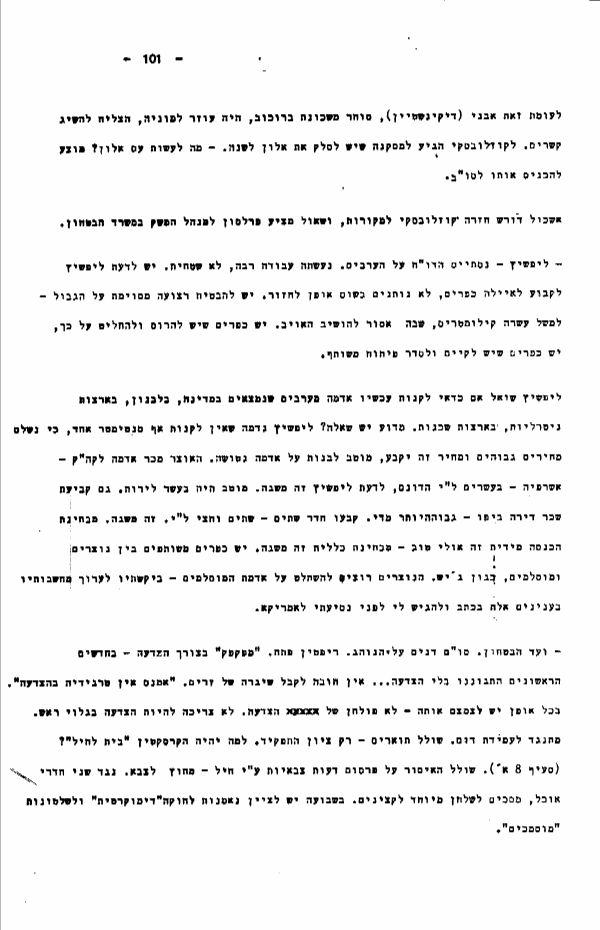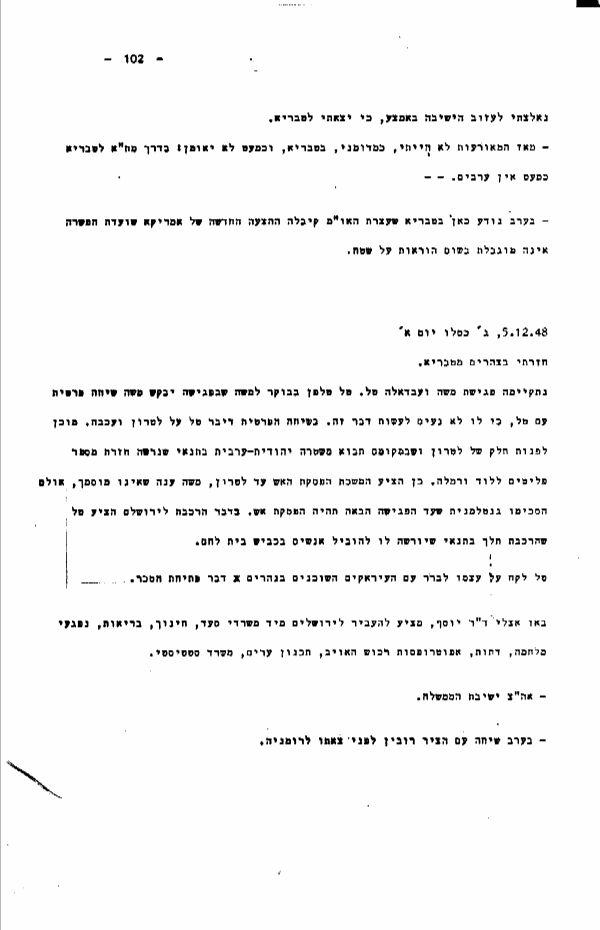Friday, December 3, 1948
Briefing with Moshe Dayan regarding the talks with [Abdallah al-]Tall: Latrun, railway, Sheikh Jarrah, [the Gulf of] ''Aqaba.
- Shaul [Avigur] and Kozlowski [Pinchas Sapir]: Need $12 million immediately, 2 million to repay debt, 10 for purchases. Someone should be sent to America for this purpose - [they] propose [Levi] Eshkol or David Hacohen. The 10 million is for cannons and airplanes. There are serious offers in France for 120 mm (field cannons [actually - heavy mortars]), 75 mm and 120 mm anti-air [cannon]s. The transfer of airplanes in Yugoslavia is delayed. Earlier they demanded repayment of the debt ($300 for each ton transferred to the country, we reduced this to 200) and we paid $600,000. Now there are other delays.
[Haim] Slavin examined the 22 (Sherman) tanks we received. He was enthusiastic about the mechanical quality. Each Sherman cost about a thousand pounds (unequipped), without transport. Their mobilization will require 3 months. They believe it will be possible to equip them with a 75 mm Krupp cannon. Slavin believes it will be possible to repair 2/3 of the broken cannons on the Shermans. He wants to assume responsibility for all the work. Brigade 8 has an important workshop, but they don't have the tools that Slavin has.
On Monday [?] we'll meet with Yosef Avidar and decide this matter.
Kozlowski [Pinchas Sapir] thinks that under the present circumstances, Alon [Yehuda Arazi] won't be suitable for procurement. He's incapable of working with anyone other than Eliahu [Sacharoff], and he's [capable of] disregarding instructions in his work. The big mess that was created in Italy was caused by him. He bought 8,000 bad shells against the opinion of experts, and also against Slavin's opinion; Alon claims that they're good but that people here don't know how to use them.
In contrast, Avni ([Yisrael] Dickenstein), a merchant from the neighborhood of Borochov, who used to assist Munya [Mardor], managed to establish contact. And Kozlowski reached the conclusion that Alon should be removed for a year.
What should be done with Alon? - The suggestion is that he be placed with Solel Boneh.
[Levi] Eshkol demands that [Pinchas] Kozlowski be returned to Mekorot, and Shaul [Avigur] proposes [Eliezer] Perlson [Peri] to manage the economy [finances and logistics] in the Defense Ministry.
- Lifshitz [Zalman Leef] - the report on Arabs has been completed. A lot of work, non-superficial, was done. Lifshitz thinks it's necessary to decide to which villages [we] will not allow [residents] to return under any circumstances. [We] need to ensure a certain strip of the border - for example 10 km - where the enemy is prohibited from settling. There are villages that have to be destroyed and this has to be decided, [and] there are villages where cooperative development should exist and be arranged.
Lifshitz asks whether now is the time to buy land from Arabs who are in the state, in Lebanon, in neutral countries, in neighboring countries. Why is there a question? - It seems to Lifshitz that [we] shouldn't buy a single centimeter, because we'll pay high prices, and this price will become fixed. It's better to build on abandoned land. The treasury sold land to KKL [Keren Kayement LeIsrael - Jewish National Fund] - Ashrafiyya [the land of Kibbutz Reshafim] - at P£ 20 per dunam. Lifshitz thinks this is a mistake. Ten liras [P£] would have been better.
Likewise the rent for an apartment in Jaffa was set too high. They set a room at two - two and a half P£. This is a mistake. In terms of immediate income maybe it's good - overall it's a mistake.
There are villages of both Christians and Muslims, such as Jish [Gush Halav]. The Christians want to take over Muslim land. - I asked him to put his thoughts on these matters in writing and submit it to me before leaving for America.
- Defense Committee. [We're] finally discussing practice [a constitution on governance and practice in the army]. [Ya'akov] Riptin opened. He "doubts" the need to salute - during the first months we defended ourselves without saluting…. There is no obligation to adopt foreigners' routines. "Although it's no tragedy to salute." In any event it should be minimized - no cult of saluting. There's no need to remove headgear when saluting. He objects to standing at attention. He rejects titles - [it's enough to] simply note the position. Why should the barracks become "the soldier's home"? (Article 8). He rejects the prohibition on a soldier publishing military opinions - outside of the army. He's against two mess halls, consents to a special table for officers. The oath should include pledging loyalty to a "democratic" constitution and "agreed-upon" authorities.
I had to leave the meeting in the middle, because I set out for Tiberias.
I don't think I've been in Tiberias since the [Arab] riots, and it's almost impossible to believe: there are almost no Arabs on the road from Tel Aviv to Tiberias.
- In the evening [we] heard here in Tiberias that the UN [General] Assembly accepted America's new proposal, that the conciliation commission won't be bound by any instructions on territory.











